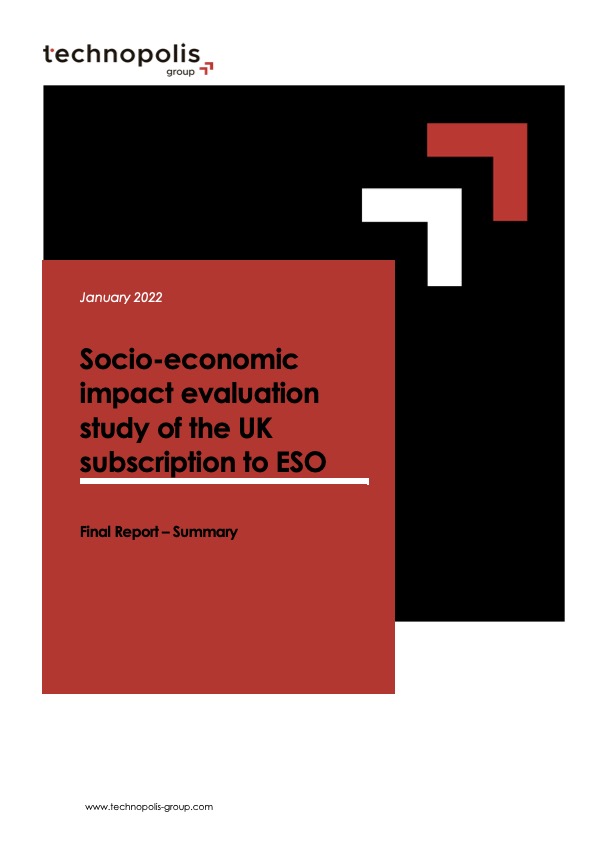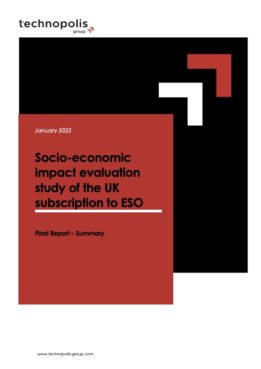Socio-economic impact evaluation study of the UK subscription to ESO
Publiceringsdatum: 11 mars 2022 | Språk: EN
The UK’s Science and Technology Facilities Council (STFC), part of UK Research and Innovation (UKRI), operates a range of world-class research facilities in the UK and manages UK access to several others internationally. These are essential to the delivery of the Council’s three-part vision (discovering the secrets of the universe, developing advanced technologies and solving real-world challenges), while also supporting UKRI’s mission of convening, catalysing and investing to build a thriving R&I system for the UK.
One such international facility is the European Southern Observatory (ESO), which designs and operates some of the largest telescopes in the world, providing state-of-the-art facilities for astronomers and astrophysicists in its Member countries (including the UK, which joined in 2002). STFC commissioned Technopolis to undertake an evaluation of the UK subscription to ESO, encompassing an impact evaluation of the benefits of membership, a process evaluation focusing on industrial return, and the development of a framework for future monitoring efforts.
Main Findings from the Impact Evaluation
World-Class Research
- ESO supports state-of-the-art research, using some of the most advanced technologies and sophisticated techniques available. It has made critical contributions to advancing understanding of the Universe, e.g. in showing its expansion is accelerating (2011 Nobel Prize), providing evidence of the black hole in the centre of our own galaxy (2020 Nobel Prize) andenabling the search for other Earth-like planets outside our solar system.
- UK scientists have preferential access to ESO facilities and are very active users, accounting for 15-20% of proposals for observation time each year. The UK also has above average success rates, and was awarded 29% of time in 2019/20 (while contributing 17% of fees).
- ESO is the most productive astronomical observatory, with over 17,000 publications based on ESO data and more than 1,000 more added each year. Nearly half of new ESO papers now involve a UK author, up from just 13% in the period before the UK joined. ESO’s science archive contains 1.5m images and 1,640TB of data, which is used heavily to support further research, especially by large numbers of UK PhD students and post-docs.
- It is difficult to maintain a very high impact as production volume goes up. As such, the UK’s combination of high output and high (and improving) citation profiles in the astronomy and astrophysics subfield since the UK joined ESO is a very strong achievement.
World-Class Innovation
- UK scientists and engineers in research laboratories and universities have been heavily involved in ESO instrument development, receiving guaranteed observation time in exchange. The UK’s significant involvement also makes it well placed to take advantage of instruments once installed. The number, scale and duration of ESO projects involving STFC’s UK Astronomy Technology Centre (UK ATC) and Rutherford Appleton Laboratories in particular has provided these institutes with a valuable platform for capability development and increased reputation.
- ESO has supported the development of novel technologies, including sodium lasers, cryogenic bearings and time reference systems, much of this with UK involvement. New applications underpinned by these technologies deliver wider societal impact, including cancer detection and treatment, as well as satellite communications.
- Membership gives UK companies preferential access to ESO contract opportunities, supporting innovation across a wide spectrum of UK industry.
- At least 258 different UK organisations have been involved in successful bids to ESO, with contracts relating to insurance, optical imaging detectors, large optics, filters, software, civil engineering, cryogenics and consultancy, amongst others.
- The UK secured £117m in ESO contracts between 2002 and 2020 (an average of £6.1m per year), which is 12% of the total going to all Member States during this time. In some years it has done even better, securing close to a quarter of the total value of contracts awarded.
- In addition to the direct value of these contracts, UK suppliers report wider benefits, including new knowledge and capabilities, staff satisfaction and access to new contacts. ESO contracts also bestow credibility and prestige on the businesses concerned. Around 40% of UK suppliers reported seeing an increase in sales income elsewhere as a result.
World-Class Skills
- UK scientists and engineers in research laboratories and universities have been heavily involved in ESO instrument development, receiving guaranteed observation time in exchange. The UK’s significant involvement also makes it well placed to take advantage of instruments once installed. The number, scale and duration of ESO projects involving STFC’s UK Astronomy Technology Centre (UK ATC) and Rutherford Appleton Laboratories in particular has provided these institutes with a valuable platform for capability development and increased reputation.
- ESO has supported the development of novel technologies, including sodium lasers, cryogenic bearings and time reference systems, much of this with UK involvement. New applications underpinned by these technologies deliver wider societal impact, including cancer detection and treatment, as well as satellite communications.
- Membership gives UK companies preferential access to ESO contract opportunities, supporting innovation across a wide spectrum of UK industry.
- At least 258 different UK organisations have been involved in successful bids to ESO, with contracts relating to insurance, optical imaging detectors, large optics, filters, software, civil engineering, cryogenics and consultancy, amongst others.
- The UK secured £117m in ESO contracts between 2002 and 2020 (an average of £6.1m per year), which is 12% of the total going to all Member States during this time. In some years it has done even better, securing close to a quarter of the total value of contracts awarded.
- In addition to the direct value of these contracts, UK suppliers report wider benefits, including new knowledge and capabilities, staff satisfaction and access to new contacts. ESO contracts also bestow credibility and prestige on the businesses concerned. Around 40% of UK suppliers reported seeing an increase in sales income elsewhere as a result.
Science diplomacy
- ESO is very visible internationally and acknowledged as a leading centre of scientific research. The UK’s membership provides it with wider opportunities and benefits, including:
- A platform for international engagement, leadership and agenda-setting.
- An ability to influence decision making, enhancing alignment with UK capabilities and priorities.
- More favourable perceptions of the UK as a country to partner with or invest in.
Costs and (monetised) Benefits
The pooled investments of ESO Members have enabled instruments and facilities that could not be developed by any one member alone. The UK’s 17% contribution supports the construction, maintenance and operation of the observatories, plus 700 staff, and provides the UK with preferential access to the facility. UK contributions have averaged £22.7m per year (2020 prices) over its 19 years of membership (excluding joining fees and a special contribution for the Extremely Large Telescope).
The small proportion of socio-economic impacts suitable for monetisation, resulted in a conservative estimate of £45.5m per annum in benefits for the UK (2020 prices), complemented by a wide range of non-monetised impacts across research, innovation, skills and diplomacy.
Recommendations for future monitoring
An updated monitoring and evaluation framework has been proposed for STFC to use in tracking the benefits flowing from the UK’s subscription to ESO. This would ensure a more wide-ranging and robust assessment of achievements and an enhanced evidence base.
Main Findings from the Process Evaluation
STFC plays a key role in promoting opportunities for UK companies to win commercial contracts from international facilities, ensuring a return from public investments.
Increasing the UK’s industrial return from ESO is a long-term goal, that is sensitive to ESO spending cycles and requires long-term commitment and investment. The UK’s return has been weaker in the last few years, largely due to it not leading the physical construction of the ELT. Returning the UK’s return coefficient (the ratio between its share of contract value and its share of membership contributions) to the ‘good’ levels achieved historically is a key challenge.
Recommendations for increasing the UK’s industrial return from ESO
The evaluation has put forward a series of recommendations for the UK ESO Industrial Liaison Officer (ILO) and wider STFC Business Opportunities team that may help to improve the UK’s industrial return from ESO in future. This includes suggestions for additional help to suppliers in understanding and interpreting requirements or in meeting the costs of bidding, further development of internal management tools and databases to better track industry engagement and target future support efforts, and looking for additional opportunities to leverage the capabilities, resources and activities of partners to raise awareness and support new and existing UK suppliers to benefit from the opportunities available through ESO.





